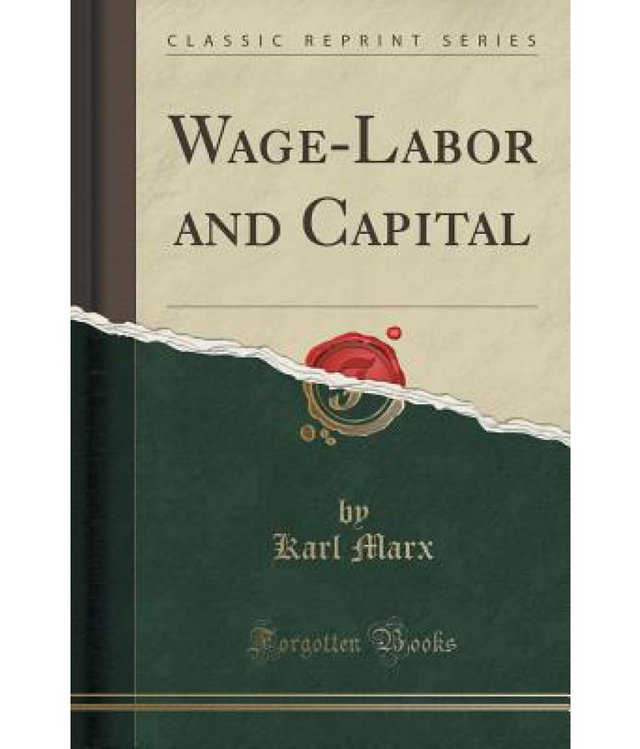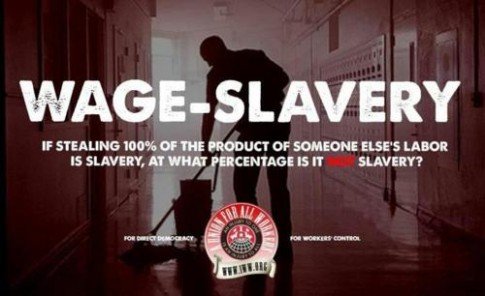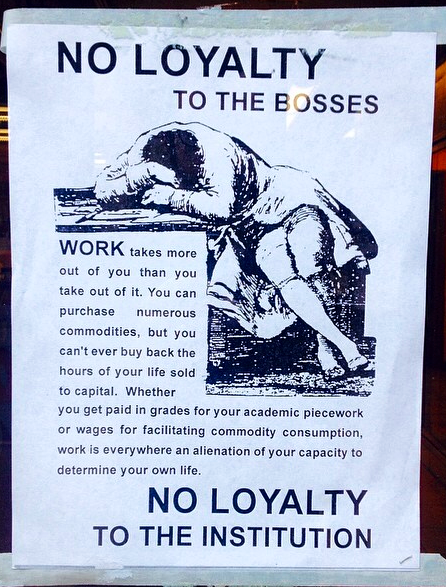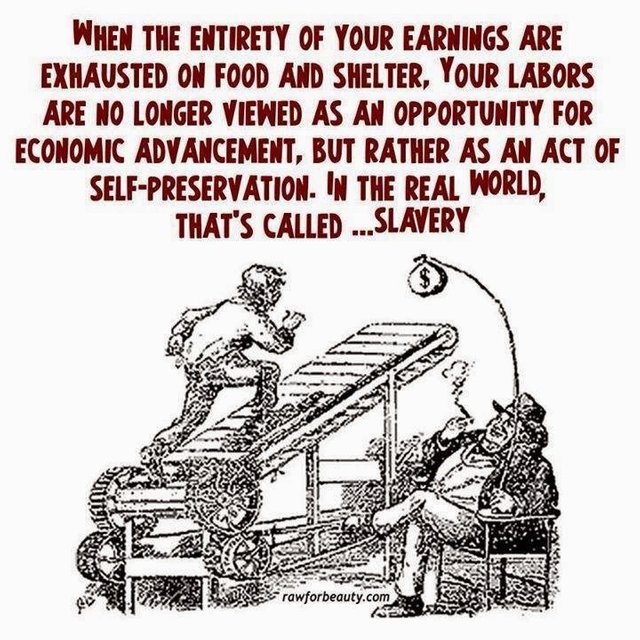Wage Labor and Capital - The Slavery they Don’t Tell You
Critiques of capitalism are often ignored or covered up. Some Steemians have gone as far as saying there are none.
The Value of Labor
In capitalism the value of labor can be defined as how much somebody is willing to pay for labor. In capitalism prices continually rise and fall, making a true value for an item impossible. Long ago it was decided that the value of an item was the amount of labor it took to create it. All items are directly tied to human labor. When efficiency grew the amount of the item grew, changing the price.
This introduced a contradiction. Labor itself is a commodity on the capitalist markets and the value is the amount an owner would pay a worker to do said labor. Imagine we have a worker who works 12 hours a day and is paid 100 dollars for that labor. Every 12 hours he produces a product worth 450 dollars out of materials worth $250. His labor would be valued at 100 dollars every 12 hours. However, he produces $200 dollars of value every 12 hours. This means in reality 6 hours of his labor is worth $100 and unless 6 equals 12 we have a contradiction. In this situation, the laborer labors 6 hours for himself and 6 hours for his boss.
How The Capitalist Value of Labor Decided
Most workman think they sell labor to the capitalist, that is wrong. What is actually sold is labor-power. This store of labor power (the worker) is used by the capitalist at the times of his choosing to do work on other commodities. Labor-power, like all things in a capitalist society, has a value. Once the commodity is made the worker has no further say in its use. The labor-power is simply a tool to be bought by a capitalist and used, it just happens to have flesh and blood. The worker simply auctions off his labor, his very self, to the highest bidder.
Since labor-power is simply another commodity in a capitalist system, it is sold by supply and demand. Both the capitalist class and the working class fight within themselves, the capitalist to get the cheapest labor-power and the working class is simply to survive. The more supply the more the suppliers (workers) must infight to survive and the less the capitalists must infight. This causes the workers to get even less and the capitalists to gain more from their labor-power.
In a capitalist economy prices fluctuate often. This, however, is always around the cost of production. As supply increases price is pushed down and then resources are moved out of manufacturing that item. This eventually results in too few people producing this item and the opposite happens. This means the average price is the real value of the object, the cost of production.
Now we arrive at the cost of production of labor-power. The cost of production of a worker is what it takes to attain the skill level required for the job. Most jobs exist at the bare minimum of requirements, only the body itself necessary. A capitalist must replace a worker after his time of use has expired in the same way as a machine. This means he must give the worker enough to survive, this was once called the minimum wage. The name has since changed to living wage as the minimum wage in many countries is lower than the living wage. This does not always hold true. Many workers are starving because the wage they receive is not enough to survive and many are getting more than the bare minimum. This increases the population, increasing the amount of workers. When the workers are given too much (as is the case when the demand is too high), their numbers increase and increase the supply. This keeps the wages and population in check.
The definition of wage slavery:
“a person who works for a wage, especially with total and immediate dependency on the income derived from such labor.” - dictionary.com
Most of this is shortened and mixed arguments from Karl Marx himself, which form the fundamentals of Leftist ideals.





Your labor is worth what your labor is worth. If you don't like the value of your labor, you can seek to increase it (training, education, etc.) or use it for yourself instead of auctioning it off (though this presents its own set of challenges and is not a guarantee of being better off). If you artificially force a higher cost for that labor then you end up pushing the price of the product or service being produced beyond what people are willing to pay (at the very least, you decrease demand). Increasing wages increases costs which increases prices. There's not a simple one to one ratio here as there are a variety of other cost, supply and demand issues but artificial manipulation of prices never works out well. It's been tried many, many times. In a highly successful economy, those at the "wage slavery" side of the equation are minimized which is all that you can ever hope to do. Fixing prices is not the way to a highly successful economy. A free market is the way to a highly successful economy though in the U.S. we are far from having such a market. Having said that, very few workers, if any, are starving.
I don't know why you see this as a contradiction. The laborer rents the job opportunity from the employer and in this case it costs the laborer $100. This is a common idea, I'm surprised you think it is some kind of secret. Many industries has associated costs, such as a taxi driver paying for a license or a freelancer renting the equipment to perform a job, such a plant hire or whatever. You also do not factor in any inefficiency or depreciation of value or ability, but of course it's a simple example.
More interesting is whether or not this can be justified or made fair by altering the rates. For example, say the employer only took a 20% cut instead of a 50% cut, would that be reasonable? What about 5%? Do you see my point?
More interesting is whether or not this can be justified or made fair by altering the rates. For example, say the employer only took a 20% cut instead of a 50% cut, would that be reasonable? What about 5%? Do you see my point?
0%
so because somebody has money they deserve to take from somebody who doesnt........ hitler is cool amiright?
So you can come to my house, demand my lawnmower, mow some lawns and take the entire takings, leaving me with my machinery at the end of the day and no share in the profit despite the machinery belonging to me?
no private property in leftism
why make a million lawn mowers for a million people when only 10k are needed....... you are literally taking resources and letting them sit there doing nothing....... that is directly hurting humanity
https://steemit.com/economics/@anarchyhasnogods/addressing-the-shared-machinery-argument-against-free-labor
made a post addressing this
I'm glad decided to address it so thoroughly, I'll read it
"rents the job opportunity"
wrong
he sells his labor......he gets nothing out of it except a wage.......what was paid for his labor-power
Wage Labor is not the biggest contradiction in Capitalism. It's very possible that the "missing" value that the worker produces is the value of risk and opportunities that the capitalist provides. The cost of resources that a capitalist provides, such as equipment, technology, and ideas should be rewarded.
Instead, the biggest contradiction in capitalism is its profit-maximizing nature. By profit-maximizing, I mean the firm's individual profit, and not economic profit. This profit-maximizing drive naturally forces firms to try and cut costs. Since labor is often the most expensive resources, firms will try to automate a worker's labor. This is were the contradiction comes in. As more firms automate, the value of labor decreases until it is not needed, meaning that firms will not have to hire workers anymore, and resulting in mass unemployment. This also means that most people in society will not have the means to buy the products the capitalist produces, causing the system to collapse.
" The cost of resources that a capitalist provides, such as equipment, technology, and ideas should be rewarded."
a person not capitalist.
even if risk is involved on the whole the capitalist class makes more than they lose (as long as the entire system doesn't collapse)......meaning on average the roi is always positive so risk is really 0 in the end
and the worker will lose his job if the capitalist doesnt make enough money......
the worker needs the money short term to survive. This means he is at a grater risk than the capitalist who has money saved up.
::: WARNING ::: Do Not Support These Witnesses Or Any On The Blockchain. Never Vote Anyone To Speak For ALL.
Do NOT Fund Steemit, or Steemit.Com. Any Of It's Tyrannical Decoy Bots Or Programs.
@ausbitbank @berniesanders @neoxian @sneak @steempipe @steemcleaners @cheeta @iflagtrash @blacklist @blacklist-a @anyx @adm @icallbs @abit @blocktrades @jesta @roadscape @charlieshrem @roelandp @gtg @witness.svk @joseph @smooth.witness @anyx @xeldal @arhag @riverhead @pfunk @good-karma @clayop @chainsquad.com @bhuz @pharesim @liondani @complexring @steempty @datasecuritynode @klye @aizensou @steemychicken1 @wackou @someguy123 @ihashfury @delegate.lafona @bacchist @busy.witness @bitcoiner @furion @dragosroua @krnel @steemed @boatymcboatface @thecryptodrive @chitty @picokernel @au1nethyb1 @cyrano.witness @fyrst-witness @timcliff @kushed @nextgencrypto @jabbasteem @masteryoda
Never Trust A Politician.
Beware These Users. They Will Lie To You & Take All You Have. Come See My Profile. See Why I'm Hidden & Spamming Post/s.
https://steemit.com/@iloveupvotes
See What Really Happens On Steemit:
https://steemit.com/abuse/@iloveupvotes/permanent-compilation-common-knowledge-base-worksheet-it-stays-because-i-said-so-iloveupvotes
Btw, I upvoted you just to be cool for posting. Sorry to have to do it this way.
What does this mean about politicians?